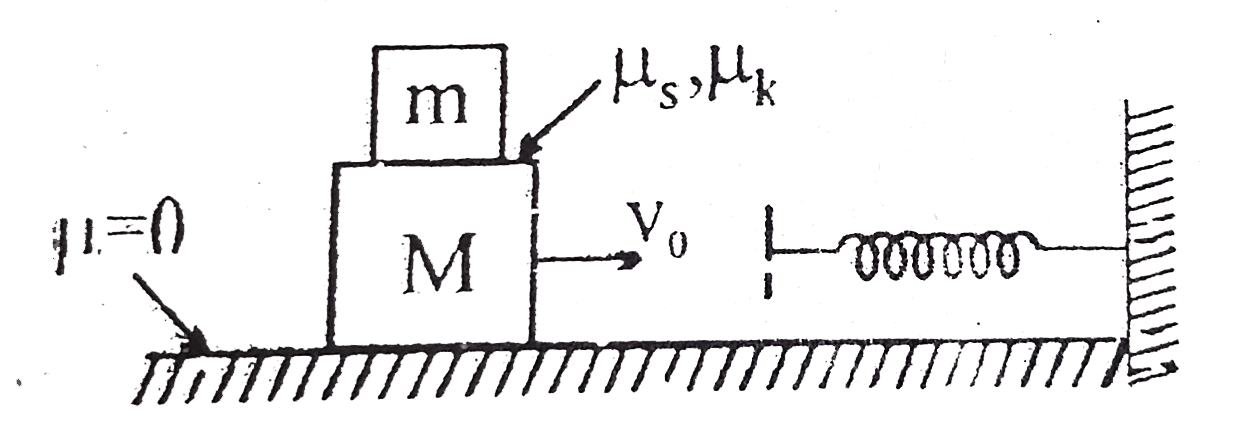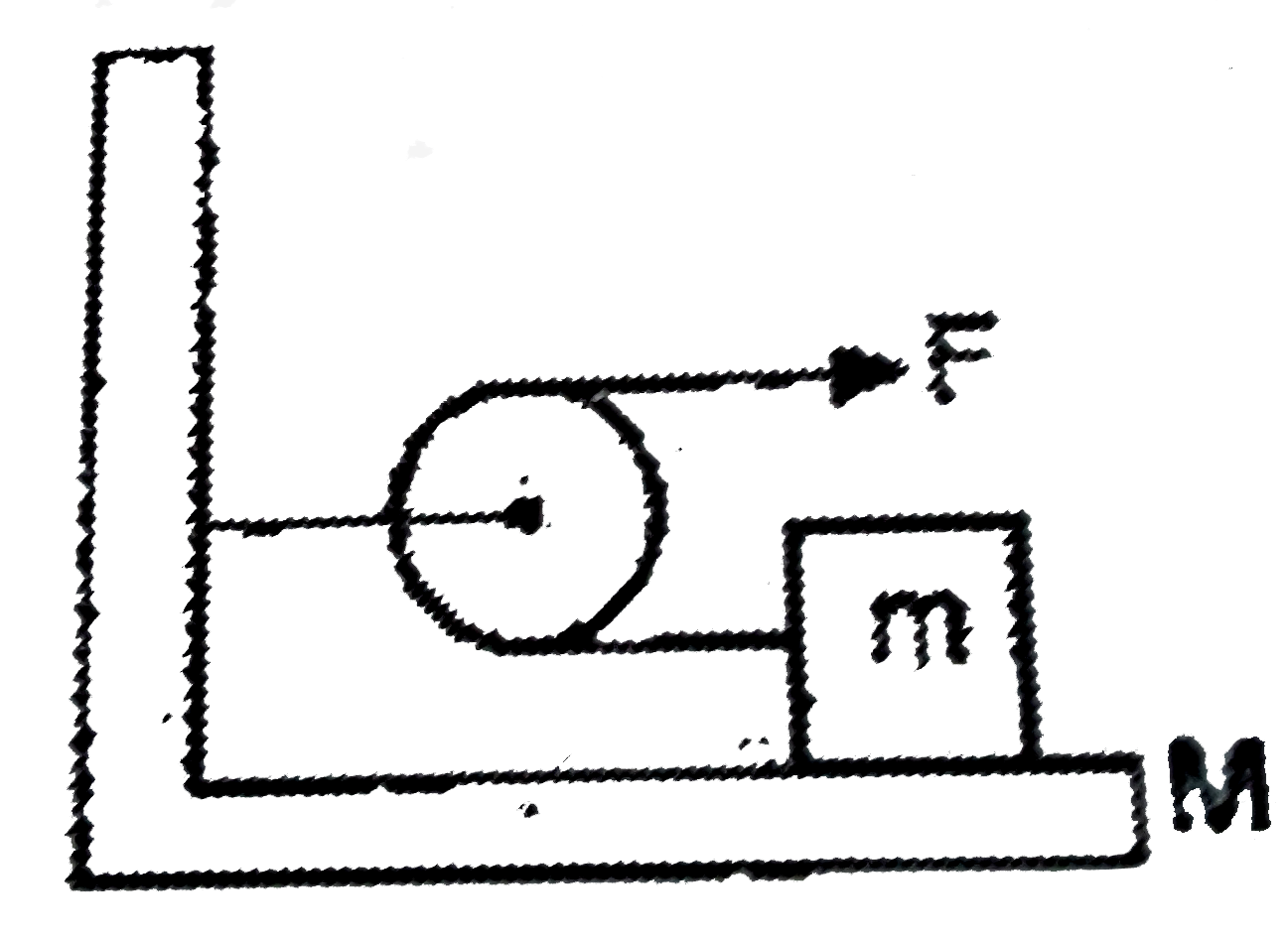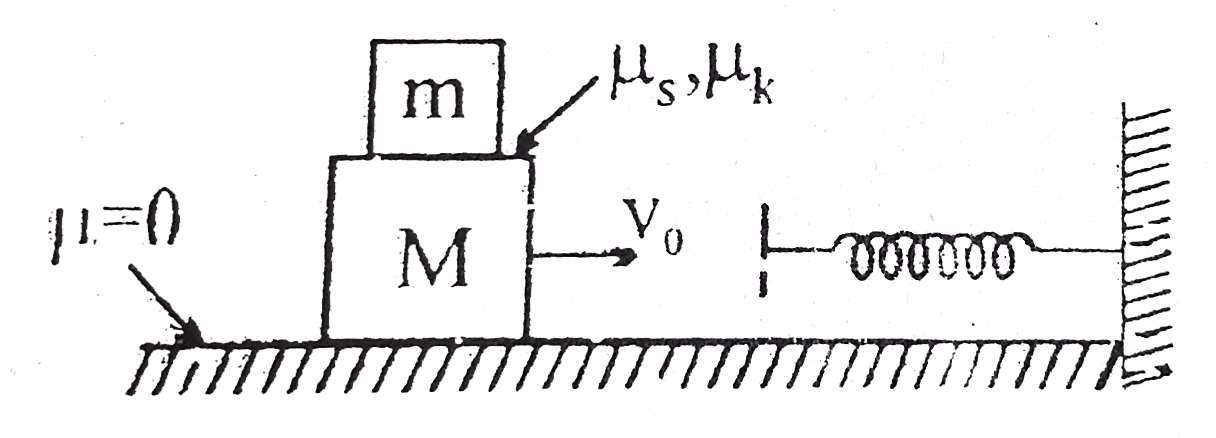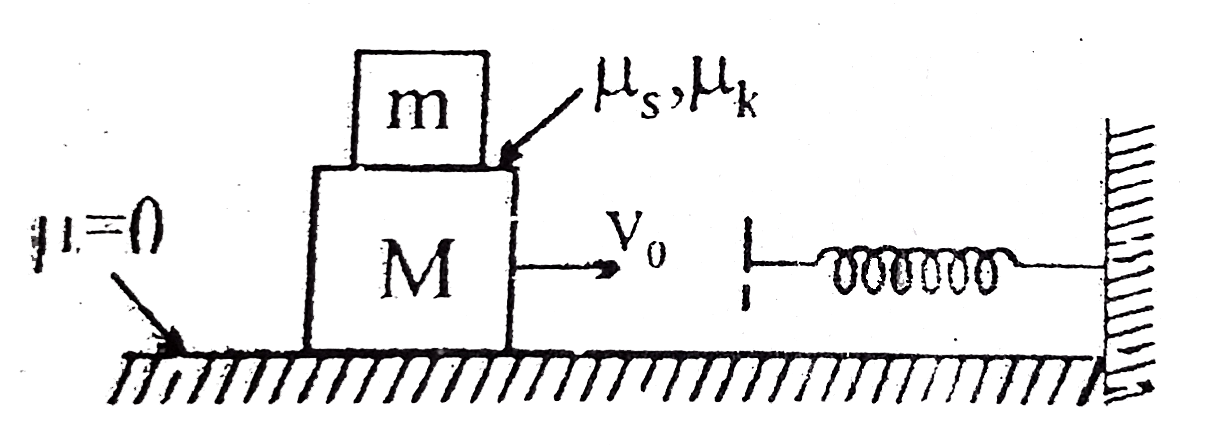A block of mass M slides on a frictionless surface with an initial speed of v0 . On top of block is small box of mass m . The coefficient of friction between box and block are μs and μk . The sliding block encounters an ideal spring with force constant k . Answer the following questions :

Assuming no relative motion between box and block what is the maximum possible acceleration of block and box at the instant of maximum compression ?
μsg
μsMgm
μs(M+m)gm
μsmgM
The correct Answer is:A
amax=μsg

Topper's Solved these Questions
- FRICTION AND CIRCULAR MOTION BOOK - GRB PUBLICATIONCHAPTER - FRICTION AND CIRCULAR MOTION EXERCISE - Integer answer
20 Videos
- FORCE AND NEWTONS LAWS OF MOTIONBOOK - GRB PUBLICATIONCHAPTER - FORCE AND NEWTONS LAWS OF MOTIONEXERCISE - Comprehension
12 Videos
- MOTION IN A STRAIGHT LINEBOOK - GRB PUBLICATIONCHAPTER - MOTION IN A STRAIGHT LINEEXERCISE - Comprehension type Queston
14 Videos
Similar Questions
A block of mass M slides on a frictionless surface with an initial speed of v0 On top of block is a small box of mass m. the coefficients of friction between box and block are μ6andμk. The sliding block encounters and ideal spring with force constant K. Answer following questions. What is maximum value of k for which it remains true that box does not slide?

View SolutionA block of mass m rests on a bracket of mass M. The coefficients of friction between block and bracket are μs and μk . The bracket rests on a frictionless surface. What is the maximum force F that can be applied if the block is not to slide on the bracket?

View Solution
Knowledge Check
A block of mass M slides on a frictionless surface with an initial speed of v0 On top of block is a small box of mass m. the coefficients of friction between box and block are μ6andμk. The sliding block encounters and ideal spring with force constant K. Answer following questions.

Assuming no relative motion between box and block what is the maximum possible acceleration of block and box at the instant of maximum compression?AμsgBμsMgmCμs(M+m)gmDμsmgMA block of mass M slides on a frictionless surface with an initial speed of v0 . On top of block is small box of mass m . The coefficient of friction between box and block are μs and μk . The sliding block encounters an ideal spring with force constant k . Answer the following questions :

What is maximum value of k for which it remains true that box does not slide ?A(μsgv0)2M(M+m)B(μsgv0)2(M+m)C(μsg2v0)2(M+m)2MDnone of theseA block of mass M slides on a frictionless surface with an initial speed of v0 On top of block is a small box of mass m. the coefficients of friction between box and block are μ6andμk. The sliding block encounters and ideal spring with force constant K. Answer following questions. What is maximum value of k for which it remains true that box does not slide?
 A(μsgv0)2M(M+m)B(μsgv0)2(M+m)C(μsg2v0)2(M+m)2MDNone of these
A(μsgv0)2M(M+m)B(μsgv0)2(M+m)C(μsg2v0)2(M+m)2MDNone of these
A block of mass M is in contact with a cart of mass M. The coefficient of static friction between block and cart is μ . To prevent the block from sliding on cart, acceleration a should be
View SolutionA block of mass M slides on a frictionless surface with an initial speed of v0 . On top of block is small box of mass m . The coefficient of friction between box and block are μs and μk . The sliding block encounters an ideal spring with force constant k . Answer the following questions :

Suppose the value of k is just slightly greater than the value found in Q.2 , so that the box begins to slide just as the spring reaches maximum compression . The accelerations of box and block are respectively :
View SolutionA block of mass M slides on a frictionless surface with an initial speed of v0 On top of block is a small box of mass m. the coefficients of friction between box and block are μ6andμk. The sliding block encounters and ideal spring with force constant K. Answer following questions. Suppose the value of k is just slightly greater then the value found in previous question, so that the box begins to slide just as the spring reaches maximum compression. The acceleration of box and block are repectively.

View SolutionA block of mass M slides on a frictionless surface with an initial speed of v0 On top of block is a small box of mass m. the coefficients of friction between box and block are μ6andμk. The sliding block encounters and ideal spring with force constant K. Answer following questions. What is maximum value of k for which it remains true that box does not slide?

View SolutionA block of mass M slides on a frictionless surface with an initial speed of v0 On top of block is a small box of mass m. the coefficients of friction between box and block are μ6andμk. The sliding block encounters and ideal spring with force constant K. Answer following questions. Suppose the value of k is just slightly greater then the value found in previous question, so that the box begins to slide just as the spring reaches maximum compression. The acceleration of box and block are repectively.

View Solution
